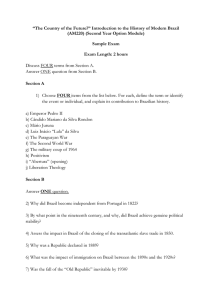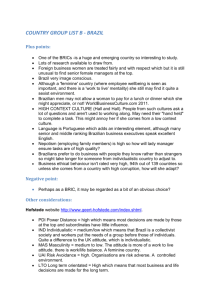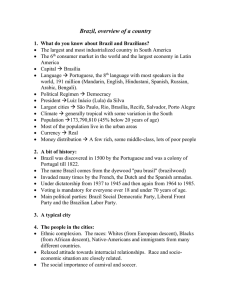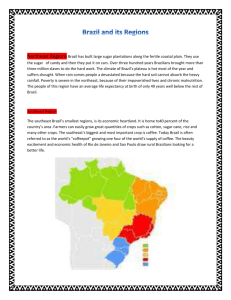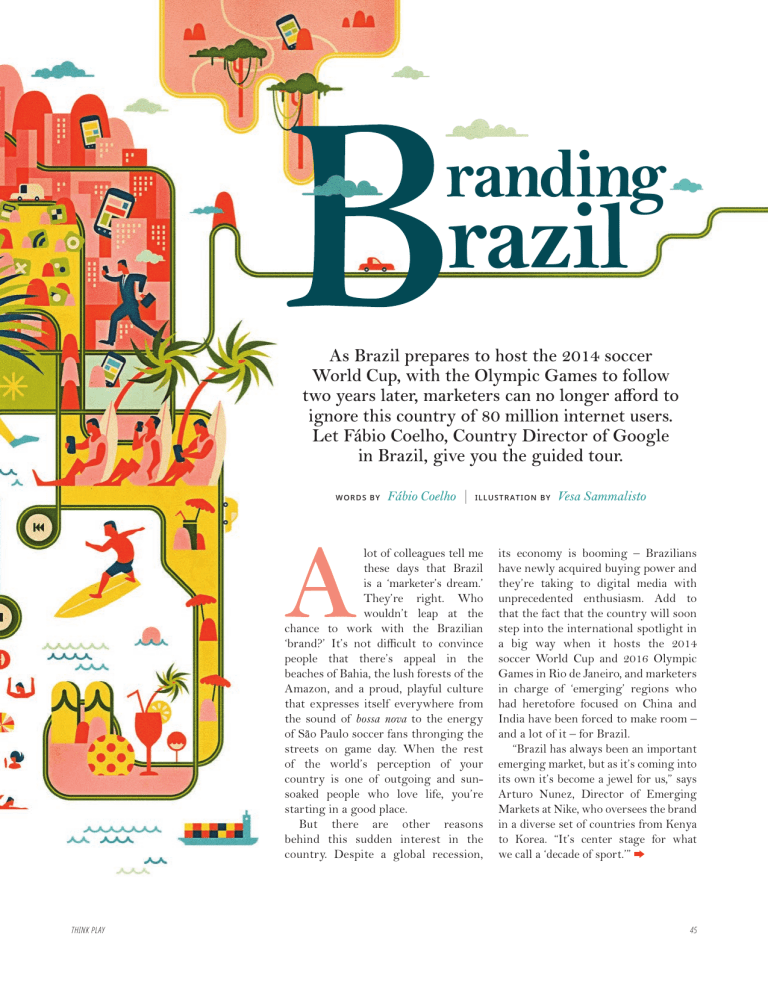
randing razil As Brazil prepares to host the 2014 soccer World Cup, with the Olympic Games to follow two years later, marketers can no longer afford to ignore this country of 80 million internet users. Let Fábio Coelho, Country Director of Google in Brazil, give you the guided tour. WORDS BY Fábio Coelho | I LLU STR ATI O N B Y lot of colleagues tell me these days that Brazil is a ‘marketer’s dream.’ They’re right. Who wouldn’t leap at the chance to work with the Brazilian ‘brand?’ It’s not difficult to convince people that there’s appeal in the beaches of Bahia, the lush forests of the Amazon, and a proud, playful culture that expresses itself everywhere from the sound of bossa nova to the energy of São Paulo soccer fans thronging the streets on game day. When the rest of the world’s perception of your country is one of outgoing and sunsoaked people who love life, you’re starting in a good place. But there are other reasons behind this sudden interest in the country. Despite a global recession, THINK PLAY Vesa Sammalisto its economy is booming – Brazilians have newly acquired buying power and they’re taking to digital media with unprecedented enthusiasm. Add to that the fact that the country will soon step into the international spotlight in a big way when it hosts the 2014 soccer World Cup and 2016 Olympic Games in Rio de Janeiro, and marketers in charge of ‘emerging’ regions who had heretofore focused on China and India have been forced to make room – and a lot of it – for Brazil. “Brazil has always been an important emerging market, but as it’s coming into its own it’s become a jewel for us,” says Arturo Nunez, Director of Emerging Markets at Nike, who oversees the brand in a diverse set of countries from Kenya to Korea. “It’s center stage for what we call a ‘decade of sport.’” 45 nowing this, where does a curious, inter­ nationally minded marketer start (aside from picking up a few basic phrases of Portuguese)? Running Brazilian operations for a company as big as Google, I find I’m asked this question a lot. My first piece of advice is to keep in mind that what’s more important than Brazil’s growth is its transformation. The way that people are consuming media and entertainment is changing dramatically, and Brazil is the place to watch it happen. One reason for this is that Brazilians have an affinity for digital and social media like few other cultures in the world. There are more cell phones here than people. It’s the world’s fifth-biggest online market, with 78.5 million people reported to have access to the internet, and 47.5 million of them accessing it actively, according to numbers released in February by market research group IBOPE and Nielsen Online. That’s an 11 percent increase from just a year ago. At Google, we’ve seen this enthusiasm firsthand. In early 2004, Orkut (a side project developed by one of our engineers) launched quietly at a time when most of the world thought that social media was a fad. But unlike much of the planet, Brazilians were ready to use social technologies dayto-day, and Orkut spread like wildfire. It’s such a cultural fixture that we now run Orkut out of Brazil, where it remains one of the top players in the social space. What this shows is that Brazil is a nation of early adopters – and not just in terms of technology. Political and economic stability are new to the country, which is only now beginning to experience a culture with an empowered middle class rather than a strict divide between the ‘haves’ and ‘have nots.’ This is a population for which so much is new that adaptability THINK PLAY “Brazil is a nation of early adopters. This is a population for which so much is new that adaptability has become second nature. Change is something we all accept now – particularly the younger generation leading the nation onto a global stage.” has become second nature. Change is something we all accept now and, for the most part, we’ve come to welcome it – particularly among the younger generation leading the nation onto a global stage. Adaptability and creativity have also been key in Brazil’s homegrown advertising market. It’s a $20bn market that’s home to award-winning, worldclass agencies, although online ads still represent less than 15 percent of total ad revenues. Brazilian agencies have had to grow used to creative thinking recently, because about five years ago the mayor of São Paulo – our largest city, and the seventh most populous in the world – passed the Clean City Law, which banned outdoor advertising. That means no billboards by the road, no advertisements on the side of buses, and no posters around town. Brazilian marketers have had to seek out new points of entry in São Paulo, including, in many cases, social media and mobile channels. The ‘guerrilla marketing’ that so many agencies across the world try to capture in order to create a unique momentum for their clients is something that’s been less of an ideal and more of a necessity in Brazil. But smart marketers here know where to look: Online. Brazil is among the top five international users for nearly all our services at Google, from Search to YouTube to Maps. YouTube in particular is a key asset because Brazilians are absolutely addicted to online video. Even though our broadband connections still aren’t on par with many countries (though a government-subsidized broad­ band plan announced last year may change this), we’re still YouTube’s fourth biggest audience world­ wide. In February, we live-streamed six days of Carnaval on YouTube, Orkut, and Google+, letting our remote viewers identify themselves on a map to show just how global this Brazilian cultural touchstone was becoming. 46 The confluence of digital media with a rising middle class has led to a particularly disruptive effect on marketers. Brazilians know what products are hot in other markets, and they want them, too. “Because they’re so connected they want the same things they’re seeing in other marketplaces,” says Nike’s Arturo Nunez. “Before, we’d do staged approaches to launching products. Today, Brazilian consumers are up there with everyone else in terms of their knowledge of these initiatives and their hunger and desire to have them in the marketplace.” ight now in Brazil, we’re excited. The 2016 Olympics will be the first time that the Games have ever been held in South America, and the 2014 World Cup will be the first time that the tournament has come to our continent since Argentina in 1978. But we have a lot of work to do in the next few years, and much of this involves things that marketers can’t control. We still have economic policies that can deter outside investment, and when you see some of the legacy infrastructure here (like Guarulhos airport in São Paulo) you might wonder how it can possibly sustain the crowds for a major sporting event. But what we Brazilian marketers can do is welcome everyone who’s interested in our culture, our digitally savvy population, and our exciting future, and properly educate them so that they keep their eyes on Brazil long after the World Cup and the Olympic Games are over. Part of that education means understanding some of the dangers inherent in the Brazilian market – and especially what sort of messaging to avoid. According to Cristiano Dias, THINK PLAY a technologist with JWT Brazil, “The number one mistake is that people still look at us as one big Latin America, and Brazilians feel almost offended by that. We are so proud of our culture and the fact that this culture is different from the rest of the continent. We were colonized by Portugal, not Spain, and we have way more African influence, Italian immigration, Japanese immigration, and all that. We pretty much don’t consume what is called ‘Hispanic’ culture, like music and TV.” For Nunez, the whole of Latin America is im­portant – Mexico is big; so is Argentina – but Brazil is in its own league, both in terms of growth and global relevance, and it has brand power. He likes to say that, when picking favorites, people often rank Brazil’s soccer team as a close second to their home nation’s. “Brazil was always said to be the market of the future,” Nunez says. “But to me, that future has arrived.” 47 47

